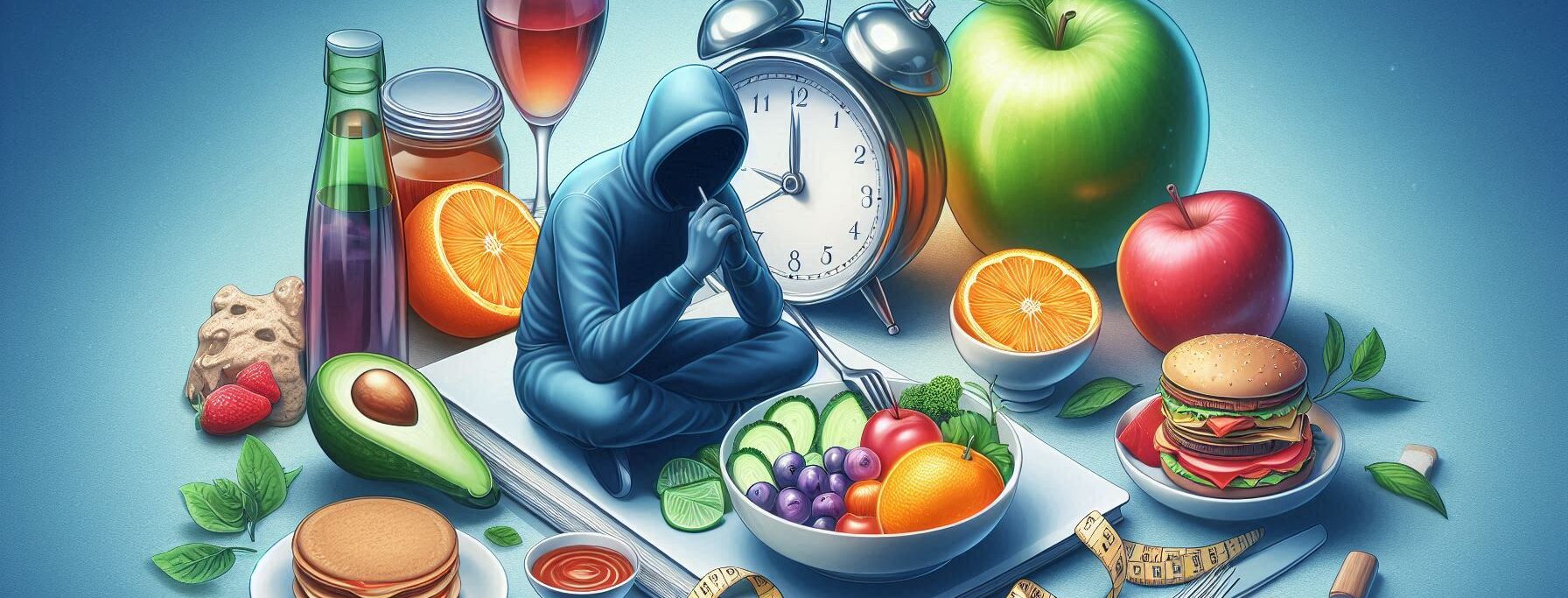Ah, emotional eating—the delightful pastime of shoving cookies into our mouths while contemplating life’s biggest mysteries, like why the cat always chooses to sit on your laptop.
If you’ve ever found yourself reaching for a pint of ice cream after a tough day or during a romantic comedy (why do they always end up together?), then welcome to the club!
Let’s dig into some strategies that can help us navigate this tricky terrain without turning into snack-obsessed zombies.
Top Takeaways and Key Concepts
Recognize emotional eating: Notice when you eat in response to feelings rather than actual hunger.
Identify triggers: Track situations, emotions, or environments that prompt overeating to gain awareness.
Use alternative coping methods: Replace food with walks, hobbies, journaling, or meditation when stressed.
Practice mindful eating: Focus on flavors, chew slowly, and pay attention to fullness cues.
Build support systems: Seek friends or family for encouragement, accountability, and distraction from cravings.
Summary of This Article
The article explores emotional eating, explaining how people consume food in response to emotions instead of hunger. It emphasizes identifying triggers, such as stress or boredom, and replacing food with healthier coping strategies like exercise, journaling, or hobbies. Mindful eating practices are encouraged to increase awareness of flavors and satiety, reducing overeating. Additionally, building a supportive network provides accountability and encouragement. The article stresses celebrating small victories, reinforcing that progress matters more than perfection while helping individuals develop sustainable, healthier relationships with food.
1. Understanding Emotional Eating

First things first: what exactly is emotional eating? It’s not just when you consume an entire bag of chips because your favorite TV character made a poor life choice.
It’s when we eat in response to feelings rather than hunger. You know those moments when you’re feeling sad, bored, or stressed and suddenly find yourself standing in front of the fridge like it holds all the answers?
Interestingly enough, many people use food as a comfort tool—like a warm blanket on a chilly night.
But let’s be fair: using food to soothe emotions can lead to some serious consequences if we don’t figure out healthier coping mechanisms. So how do we break this cycle?
2. Identify Your Triggers
Okay, here’s where it gets real: we need to identify what triggers our emotional eating habits. Is it stress from work?
The sight of leftover pizza? Or maybe it's seeing your ex at the grocery store buying kale (who does that?). By pinpointing these triggers, we can start developing strategies to combat them.
I once had a friend who would keep chocolate hidden in her desk drawer for “emergency situations.” Spoiler alert: every situation was an emergency!
Keeping track of your feelings and what leads you to snack can help create awareness about those pesky patterns that sneak up on us like ninjas in the night.
3. Find Alternative Coping Mechanisms
Now that we've identified our triggers, let's talk solutions! Instead of diving headfirst into a tub of ice cream whenever life gets tough, consider exploring other ways to cope with those emotions. I mean, sure, ice cream is delicious—but so is going for a walk or calling up a friend!
By trying activities like journaling (to pour out your thoughts), meditating (which sounds fancy but really just means sitting quietly), or even picking up a new hobby (who knew knitting could be therapeutic?), you might discover healthier outlets for your feelings that won’t leave you feeling guilty afterward.
4. Mindful Eating Practices
Speaking of guilt—let's dive into mindful eating practices! This isn't about sitting cross-legged while chanting mantras; it's more about paying attention when you eat instead of mindlessly munching while scrolling through social media feeds filled with cute puppies and avocado toast.
Try savoring each bite as if you're tasting gourmet cuisine—even if it’s just plain old peanut butter on toast! Focus on flavors and textures instead of zoning out in front of the TV with snacks galore.
This way, you'll not only enjoy your food more but also realize when you've had enough—because nobody needs three servings of lasagna unless they’re training for an Italian pasta-eating championship!
5. Build A Support System
Let’s be honest: navigating emotional eating alone is like trying to swim across the ocean without floaties—it’s dangerous and likely ends badly! Building a support system can make all the difference when fighting against those pesky cravings.
Reach out to friends or family members who understand what you're going through; they can provide encouragement and accountability as well as join in fun activities that distract from food temptations—like karaoke nights where nobody cares how off-key you sing!
6. Celebrate Small Wins
Finally—and I cannot stress this enough—celebrate small victories along your journey! Did you choose fruit over cookies one afternoon?
High-five yourself! Managed not to binge-watch an entire series while snacking mindlessly? Treat yourself by doing something fun instead!
Remember that progress takes time; it's not about being perfect but rather making better choices most days—not every single one because let’s face it; perfection doesn’t exist outside Instagram filters!
Suggested Resources:
Understanding Emotional Eating
https://www.psychologytoday.com/us/blog/the-moment-youth/201904/understanding-emotional-eating
Mindful Eating Techniques
https://www.eatright.org/health/wellness/mindful-eating/mindful-eating-techniques
Coping Strategies for Stress
https://www.apa.org/topics/stress/coping-strategies
Frequently Asked Questions
What is emotional eating?
Emotional eating occurs when you eat in response to feelings like stress, boredom, or sadness rather than physical hunger.
How can I identify my emotional eating triggers?
Track your moods, situations, and cravings to notice patterns. Recognizing triggers helps you understand what leads to overeating.
What are healthier alternatives to emotional eating?
Try activities such as walking, journaling, meditating, or engaging in hobbies. These methods help manage emotions without relying on food.
How does mindful eating reduce emotional eating?
Mindful eating encourages you to slow down and focus on flavors, textures, and fullness cues, which helps prevent overeating.
Can emotional eating be managed without giving up favorite foods?
Yes. The goal is to build awareness and balance, not eliminate enjoyable foods. Mindful choices help reduce guilt and promote better habits.
Why is a support system important for overcoming emotional eating?
Support from friends or family provides accountability, encouragement, and healthy distractions that make resisting cravings easier.
How do small wins help with emotional eating?
Celebrating small victories builds confidence and reinforces progress, helping you stay motivated on your journey to healthier habits.

Kevin Collier is a dedicated health enthusiast and writer for FatFAQ.com, where he shares his expertise on weight loss and maintaining a healthy lifestyle. With a focus on practical tips and evidence-based strategies, Kevin aims to inspire readers to achieve their health goals through informed choices. His engaging articles cover nutrition, exercise, and holistic wellness, providing valuable resources for anyone looking to improve their well-being. Passionate about helping others transform their lives, Kevin advocates for sustainable habits that promote lasting health and vitality.




